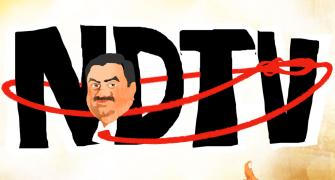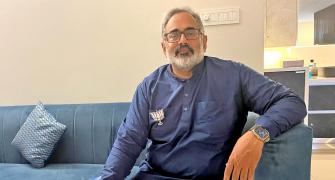India Semiconductor Association, the newly-formalised lobby for the sector, says, "India is at an inflection point in the semiconductor industry. While its small size today allows no correlation with what is happening in the sector worldwide, in 10 years it will be 'huge'," say executives of firms like Motorola, TI and Broadcom.
Globally, there has been a dramatic increase in the consumption of products that have one or the other semiconductor chip inside, said Arun Jain, sales manager with Freescale Semiconductor, a Motorola firm.
In addition to the huge numbers of consumer electronics goods, mobile phones and an increasing number of wireless devices, markets were growing in areas like aerospace and defence and auto-electronics, he said.
To study the potential for 'design services' in all these areas, ISA has commissioned a study, by a New York, US-headquartered consultancy, Frost and Sullivan, Rajendra Khare, head of original design maker, Broadcom's India operations.
The study, Indian Semiconductor Market: Consumption Assessment, growth areas and development of Ecosystem, was the first of its kind in the country and will be 'the most comprehensive effort undertaken to put together a clear snapshot of the industry,' an ISA release said.
The results of the study will be out in 20 weeks, Khare said.
The study will be in three parts, said Anand Rangachary, a director with the consultancy -- the size of the industry in the country, the ecosystem needed for the growth of the industry here, including the manpower requirements and the growth of the end-user firms. The end-users will typically be large consumers of semiconductor chips, producing various products.
"We will conduct some 600 interviews across various semiconductor firms in the country and identify the demand drivers as well as constraints," Rangachary said.
"This will give us data which, fed into a proprietary forecasting model, will yield a view of what the industry could be like say 10 years from now."
Preliminary investigations suggest the market could be anything between $1 billion and $3.5 billion, he said. This was too small to find correlation with or be impacted by worldwide trends in the cyclical semiconductor industry.
That worldwide sales of semiconductor chips during the first quarter of calendar year 2005 grew a healthy 13.5 per cent will not therefore have a serious impact on the industry in India. It was too small for it, Jain said.
"Semiconductors was a technology-driven industry and sits at the core of a process that drives several other industries," Khare said.
"For every semiconductor engineer, there will be 10 software developers making various programmes and applications that form the bulk of product software. This meant that the demand for software talent will also grow, as the semiconductor industry itself grew," Khare added.
"What we have now is the design side of the business, which has grown to be robust enough," says Khare who is also the chairman of the 75-member strong ISA.
"On the manufacturing side, we have made a small beginning but let us see, hopefully that too will come up," he hinted.
At least one silicon wafer maker, a South Korean firm, is said to be interested in setting up its foundry in India, in Andhra Pradesh.
Others in the industry point to the glut in the foundry business and say it is not so much the presence of a foundry that will boost India's semiconductor prospects as would the growth of the domestic market for products which have semiconductor chips in them. A strong growth will automatically bring the global players to make more and more of their products in the country, they said.
The Frost and Sullivan study is sponsored by Citigroup, which has been invested in the Indian technology sector for over a decade, said Radhika Sinha, a vice president with the financial services conglomerate's Indian business.
"Credible information on any market will enable a dialogue between investors and the businesses," Sinha said. Citigroup hoped this study will also facilitate such a dialogue in the semiconductor industry in India, she said.







